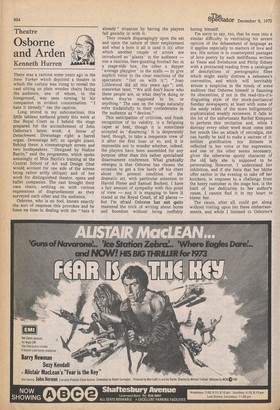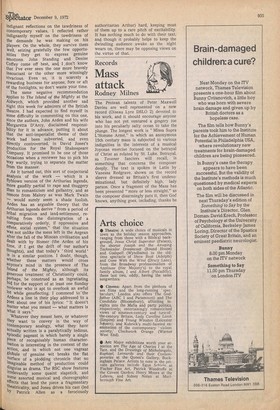Theatre Osborne and Arden Kenneth Hurren
There was a cartoon some years ago in the New Yorker which depicted a theatre in which the curtain was rising to reveal the cast sitting on plain wooden chairs facing the audience, one of whom, in the foreground, was seen turning to his companion in evident consternation, "I hate it already," ran the caption.
Long stored in my subconscious, this little tableau surfaced grimly this week at the Royal Court as I beheld the stage prepared for the accouchement of John Osborne's latest work, A Sense of Detachment. Downstage right: a barrel organ. Downstage left: an upright piano. Behind these: a cinematograph screen and two loudspeakers. "Designed by Nadine Baylis," said the programme, which spoke amusingly of Miss Baylis's training at the Central School of Art and Design (that would, account for one side of the screen being rather artily oblique) and of her work for distinguished theatre, opera and ballet companies. The cast brought their own chairs, ambling on with various expressions of disgruntlement as they surveyed each other and the audience.
Osborne, who is no fool, knows exactly the sort of response this provokes and he loses no time in dealing with the "hate it already" situation by having the players fall genially in with it.
They remark disparagingly upon the set and upon the nature of their employment and what a bore it all is (and it is); after which another couple of actors are introduced as ' plants ' in the audience — one a raucous, beer-guzzling football fan in a stage-side box, the other a dapper 'average playgoer' in the stalls — to give explicit voice to the clear reactions of the spectators: "Get on with it "; "Joan Littlewood did all this years ago "; and, somewhat later, "We still don't know who these people are, or what they're doing or where they're supposed to be, or anything." The cast on the stage naturally refer disdainfully to their confederates in the audience as "devices."
This anticipation of criticism, and frank recognition of its validity, is a fatiguing caper at best, though it is sometimes accepted as 'disarming.' It is desperately hard, though, to take a temperate view of it after the first hour or so, and it is impossible not to wonder whether, indeed, the players have been assembled for any purpose other than this rather specialised disarmament conference. What gradually emerges is that Osborne has chosen the occasion to get a few beefs off his chest about the present condition of the dramatic art, with particular attention to Harold Pinter and Samuel Beckett. I have a fair amount of sympathy with this point of view — and it is engaging to have it stated at the Royal Court, of all places — but I'm afraid Osborne has not quite mastered the trick of writing about bores and boredom without being ineffably
boring himself.
I'm sorry to say, too, that he runs into a similar difficulty in ventilating his severe opinion of the debasement of language as it applies especially to matters of love and sex. His notion is to counterpoint passages of love poetry by such mellifluous writers as Yeats and Swinburne and Philip Sidney with a protracted reading from a catalogue of descriptions of pornographic films which might easily distress a salesmen's convention, and which will inevitably arouse a suspicion in the minds of some auditors that Osborne himself is flaunting its obscenities, if not in the read-this-it'sdisgusting style of the mock-puritanical Sunday newspapers, at least with some of the seedy relish of the more belligerently sophisticated weekly reviewers. It falls to the lot of the unfortunate Rachel Kempson to perform this recitation and, while I daresay every other word must come into her mouth like an attack of neuralgia, she can hardly be said to make a success of it: neither gratification nor distaste is reflected in her voice or her expression, and one or the other seems necessary, given the otherwise sporty character of the old lady she is supposed to be personating. However, I understand her inhibition, and if she feels that her blithe offer earlier in the evening to take off her knickers, in response to a challenge from the beery customer in the stage box, is the limit of her dedication to her author's cause, I cannot find it in my heart to blame her.
The cause, after all, could get along without visiting upon her these embarrassments, and while I listened to Osborne's
indignant reflections on the tawdriness of contemporary values, I reflected rather. indignantly myself on the tawdriness of the demands he was making on his Players. On the whole, they survive them Well, seizing gratefully the few opportunities they get to express genuine emotions. John Standing and Denise Coffey come off best, and I , don't know that I've ever seen the one more bravely insouciant or the other more winningly vivacious. Even so, it is scarcely a rewarding business for anyone, fore or aft of the footlights, so don't waste your time.
The same negative recommendation applies to The Island of the Mighty at the Aldwych, which provided another sad night this week for admirers of the British theatre. I had expected to find myself in some difficulty in commenting on this one, since the authors, John Arden and his wife Margaretta D'Arcy, disclaimed responsibility for it in advance, putting it about that the anti-imperialist theme of their Work had been subverted, and even directly controverted, in David Jones's Production for the Royal Shakespeare Company, It promised to be one of those occasions when a reviewer has to pick his Way warily, trying to separate the matter from the manner.
As it turned out, this sort of conjectural analysis of the work — which is a flYblown version of the Arthurian legends, More gaudily partial to rape and thuggery than to romanticism and gallantry, and as remote from Malory as was Mark Twain
would surely seem a shade foolish. Arden has an arguable theory that the Arthurian legends derive "from a period of tribal migration and land-settlement, resUlting from the disintegration of a Comparatively orderly, if oppressive and effete, social system," that the situation Was not unlike the mess left in the Aegean after the fall of the Minoan civilisation and dealt with by Homer (the Arden of his time, if I get the drift of our author's thoughts), and that today's ' third world' is in a similar position. I doubt, though, Whether these matters would cross anYone's mind in the presence of The Island of the Mighty, although its generous treatment of Christianity could, Perhaps, be construed as an ingratiating hid for the support of at least one Sunday reviewer who is apt to overlook an awful lot while genuflecting. I commend to " the Ardens a line in their play addressed to a Poet about one of his lyrics: "It doesn't matter what you meant — what matters is What it says." Whatever they meant here, or whatever they want to convey in the way of Contemporary analogy, what they have actually written is a paralytically tedious, episodic pageant in which barely a single piece of recognisably human characterisation is interesting in the context of the action, and in which not one vagrant globule of genuine wit breaks the flat ,81-1rfaCe of a plodding chronicle that no 'Thagifl method of production could disguise as drama. The RSC show features irrelevantly some quaint slapstick, and some assorted musical and choreographic effects that lend the piece a fragmentary theatricality, and Jones drives his cast (led bY Patrick Allen as a ferociously
authoritarian Arthur) hard, keeping most of them up to a rare pitch of excitability. It has nothing much to do with their text, and though it probably helps to keep the dwindling audience awake as the night wears on, there may be opposing views on the virtue of that.











































 Previous page
Previous page